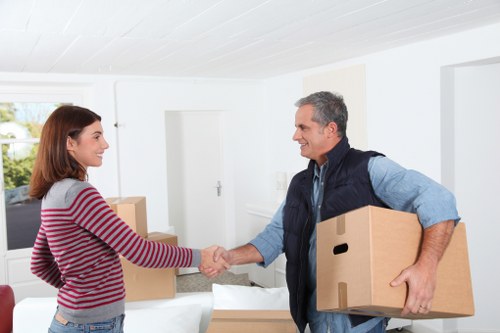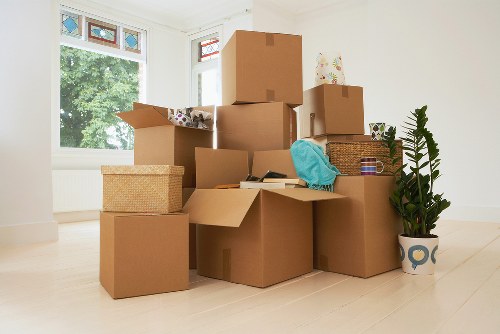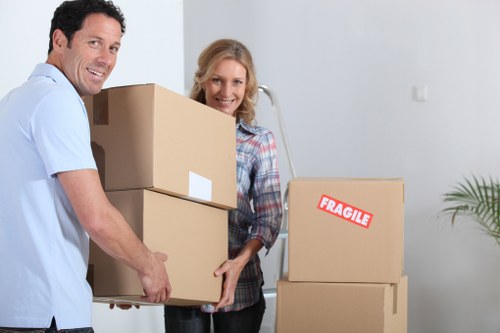White Goods Recycle East London

Recycling white goods in East London is not just an environmentally responsible choice, but also a convenient option for residents looking to dispose of their old appliances. White goods, such as refrigerators, washing machines, and dishwashers, are essential in every household, but when they reach the end of their life cycle, proper disposal is crucial to prevent environmental harm and promote sustainability.
East London has seen a surge in recycling initiatives aimed at making the process seamless and efficient for its residents. With the growing awareness of environmental issues, more people are choosing to recycle their white goods rather than sending them to landfills.
Understanding the benefits and processes involved in white goods recycling can help you make informed decisions about your old appliances. This article explores the various aspects of recycling white goods in East London, including methods, benefits, and the areas serviced.

Why Recycle White Goods?
Recycling white goods offers numerous benefits, both for the environment and for consumers. By recycling appliances, you reduce the amount of waste that ends up in landfills, conserve natural resources, and lower your carbon footprint. Additionally, recycling centers often recover valuable materials from old appliances, which can be reused in the manufacturing of new products.
Proper disposal of white goods also ensures that harmful chemicals, such as refrigerants from refrigerators and air conditioners, are handled safely. These substances can cause significant environmental damage if not managed correctly.
Moreover, recycling white goods can contribute to a circular economy, where products are reused and recycled, minimizing waste and promoting sustainability.

How to Recycle White Goods in East London
Recycling white goods in East London is a straightforward process, thanks to the numerous services and facilities available. Here are the steps you can follow to recycle your old appliances:
- Identify Recyclable Appliances: Determine which white goods you want to recycle. Common recyclable items include refrigerators, washing machines, dryers, dishwashers, and kettles.
- Choose a Recycling Service: East London offers various recycling services, including municipal collection, private recycling companies, and charity organizations that accept white goods.
- Schedule a Pickup or Drop-off: Depending on the service you choose, you can either schedule a pickup from your home or drop off the appliances at a designated recycling center.
- Prepare the Appliances: Ensure that the appliances are clean and, if necessary, disconnect them from power sources. Some services may require you to remove certain parts or packaging.
- Recycling Process: The recycling service will handle the transportation and processing of your white goods, ensuring that materials are properly sorted and recycled.

Local Recycling Centers in East London
East London is home to several recycling centers equipped to handle white goods. These facilities adhere to strict environmental standards, ensuring that your old appliances are processed responsibly. Some of the key recycling centers include:
- Newham Recycling Centre: Located in Stratford, this center offers comprehensive recycling services for all types of white goods.
- Tower Hamlets Waste Transfer Station: Situated near Canary Wharf, it provides convenient drop-off options for residents in the surrounding areas.
- Barking and Dagenham Recycling Hub: This facility caters to the eastern parts of London, ensuring easy access for nearby residents.
These centers not only accept white goods but also provide information on how to recycle them effectively.

The Importance of Responsible Recycling
Responsible recycling of white goods is essential for several reasons. Firstly, it helps in reducing the environmental impact by preventing hazardous materials from polluting the soil and water. Proper recycling ensures that metals and plastics are recovered and reused, conserving natural resources and reducing the need for new raw materials.
Secondly, recycling contributes to energy conservation. Manufacturing products from recycled materials generally consumes less energy compared to producing them from scratch. This reduction in energy usage leads to lower greenhouse gas emissions, combating climate change.
Furthermore, responsible recycling supports the local economy by creating jobs in the recycling and manufacturing sectors. It also fosters a culture of sustainability and environmental responsibility among residents.
Legal Requirements for Recycling White Goods
In the UK, there are specific regulations governing the disposal and recycling of white goods. The Waste Electrical and Electronic Equipment (WEEE) Regulations require that manufacturers and importers take responsibility for the collection and recycling of electrical appliances.
As a consumer, you are also responsible for ensuring that your old appliances are disposed of through authorized channels. Illegal disposal or dumping of white goods can result in hefty fines and environmental damage.
By adhering to these regulations and choosing authorized recycling services, you contribute to a sustainable and legally compliant waste management system.

Cost-Effective Recycling Options
Recycling white goods in East London can often be done at little to no cost to the consumer. Many recycling centers provide free pickup services for large appliances, especially if they are still in working condition and can be donated to charities.
For appliances that are no longer functional, recycling services ensure that they are processed responsibly without charging fees. Some private companies also offer competitive pricing for the recycling of multiple appliances.
Additionally, certain incentives and government programs may be available to encourage recycling, making it a cost-effective choice for residents.
Benefits of Recycling White Goods
- Environmental Protection: Reduces landfill waste and prevents pollution from hazardous materials.
- Resource Conservation: Recovers valuable materials like metals and plastics for reuse.
- Energy Savings: Lower energy consumption in manufacturing recycled products.
- Economic Advantages: Creates jobs and supports the recycling industry.
- Compliance: Meets legal requirements for waste disposal.

Choosing the Right Recycling Service
When selecting a recycling service in East London, consider the following factors to ensure a smooth and responsible disposal process:
- Reputation: Look for services with positive reviews and a track record of responsible recycling.
- Certification: Ensure that the recycling center is certified and adheres to environmental regulations.
- Convenience: Choose a service that offers flexible pickup times or has nearby drop-off locations.
- Transparency: Opt for services that provide clear information about their recycling processes and outcomes.
- Cost: Compare pricing structures to find an affordable option that meets your needs.
By considering these factors, you can select a recycling service that aligns with your values and requirements.
Preparing Your Appliances for Recycling
Proper preparation of your white goods ensures that the recycling process is efficient and safe. Here are some steps to follow:
- Disconnect and Clean: Unplug appliances and clean them to remove any food residue or personal items.
- Remove Accessories: Take out any detachable parts, such as trays or filters, and dispose of them separately if required.
- Secure Loose Components: Tape doors or remove handles to prevent accidents during transportation.
- Check for Hazardous Materials: Some appliances may contain batteries or refrigerants that need special handling.
- Sort if Necessary: If you have multiple appliances, sort them according to the recycling service's guidelines.

Environmental Impact of White Goods Recycling
The recycling of white goods has a significant positive impact on the environment. By diverting appliances from landfills, you help reduce methane emissions, a potent greenhouse gas generated by decomposing waste. Additionally, recycling metals and plastics conserves finite resources and reduces the need for mining and manufacturing of new materials.
Proper disposal of refrigerants and other hazardous substances prevents soil and water contamination, safeguarding ecosystems and human health. Furthermore, the reduction in energy consumption associated with recycling contributes to lower carbon emissions, combating climate change.
Overall, white goods recycling plays a crucial role in fostering a sustainable environment and promoting responsible consumption.
Innovations in Recycling Technology
Advancements in recycling technology have made the process of recycling white goods more efficient and effective. Modern facilities employ state-of-the-art machinery to disassemble appliances, extract valuable materials, and safely handle hazardous components.
Automation and robotics are increasingly used to sort and process materials, reducing the need for manual labor and minimizing the risk of contamination. Additionally, improvements in chemical recycling methods allow for the recovery of rare materials used in electronic components.
These technological innovations not only enhance the efficiency of recycling centers but also improve the quality of recycled materials, making them more viable for use in new products.

Local Initiatives Promoting Recycling
East London is home to several local initiatives aimed at promoting the recycling of white goods and other appliances. These programs are designed to educate residents about the importance of recycling and to provide accessible options for appliance disposal.
- Community Recycling Drives: Local organizations regularly host events where residents can drop off old appliances for recycling.
- Educational Workshops: Workshops and seminars are conducted to inform the community about sustainable practices and the benefits of recycling.
- Partnerships with Retailers: Collaborations with appliance retailers allow for the collection and recycling of old white goods at the point of sale.
- Incentive Programs: Some initiatives offer incentives, such as discounts or vouchers, to encourage residents to recycle their appliances.
These initiatives play a vital role in increasing recycling rates and fostering a culture of environmental responsibility in East London.
Charity Organizations and Recycling
Several charity organizations in East London accept white goods and other appliances in good working condition. Donating to these charities not only helps recycle your old appliances but also supports those in need. Organizations like the East London Furniture & White Goods Recycling Centre take in donations and either distribute them to communities or refurbish them for resale.
By choosing to donate instead of discarding your appliances, you contribute to both environmental sustainability and social welfare, making it a win-win situation.

Challenges in White Goods Recycling
Despite the benefits, recycling white goods presents several challenges. One of the primary obstacles is the complexity of disassembling modern appliances, which are often designed with intricate components and materials that are difficult to separate.
Additionally, the transportation of large appliances can be logistically challenging and expensive, especially in densely populated areas like East London. Ensuring that appliances are collected and processed without causing disruption to neighborhoods requires careful planning and coordination.
Another challenge is the varying levels of public awareness and participation in recycling programs. While awareness has increased, there is still a need for more comprehensive education and engagement to ensure higher recycling rates.
Solutions to Improve Recycling Rates
To overcome these challenges, several solutions can be implemented:
- Enhanced Public Awareness Campaigns: Increase education efforts to inform residents about the importance and methods of recycling white goods.
- Improved Recycling Infrastructure: Invest in better facilities and transportation networks to handle the collection and processing of large appliances efficiently.
- Incentivization: Offer incentives, such as discounts on new appliances or financial rewards, to encourage more people to recycle their old white goods.
- Standardization: Develop standardized guidelines for appliance manufacturers to simplify the recycling process.
- Community Engagement: Foster community-based recycling programs that involve local residents and organizations in the recycling process.
Implementing these solutions can significantly enhance the effectiveness and efficiency of white goods recycling in East London.

Benefits to the Community
Recycling white goods in East London brings numerous benefits to the community. It helps create a cleaner and healthier environment by reducing pollution and conserving natural resources. Moreover, it promotes a sense of collective responsibility and fosters community spirit as residents work together towards a common goal of sustainability.
The recycling industry also contributes to the local economy by creating jobs and supporting businesses involved in the collection, processing, and refurbishment of appliances. Additionally, donation programs that accept working appliances help provide essential goods to those in need, enhancing social welfare.
Sustainable Living Practices
Engaging in white goods recycling is part of a broader commitment to sustainable living. By prioritizing recycling and responsible consumption, residents can minimize their environmental impact and contribute to a more sustainable future.
Adopting other sustainable practices, such as reducing energy consumption, using energy-efficient appliances, and supporting eco-friendly products, complements recycling efforts and amplifies their positive effects.
Together, these actions create a comprehensive approach to sustainability that benefits both the environment and the community.

Government Support and Regulations
The UK government provides support and regulations to facilitate the recycling of white goods. Policies such as the Waste Electrical and Electronic Equipment (WEEE) Regulations mandate that producers take responsibility for the collection and recycling of their products.
Government grants and funding are available to support recycling initiatives and infrastructure development in East London. These resources help expand the capacity of recycling centers and promote the adoption of advanced recycling technologies.
Additionally, the government runs awareness campaigns to educate the public about the importance of recycling and how to participate effectively. Compliance with these regulations ensures that recycling practices are standardized and environmentally sound.
Future Trends in White Goods Recycling
The future of white goods recycling is poised for significant advancements driven by technological innovation and increasing environmental consciousness. Emerging trends include:
- Smart Recycling Systems: Integration of IoT and AI technologies to streamline the recycling process and improve efficiency.
- Circular Economy Models: Enhanced focus on designing appliances for easier disassembly and longer lifespans, promoting reuse and recycling.
- Increased Automation: Use of robotics and automation in recycling facilities to handle complex disassembly and material sorting.
- Advanced Material Recovery: Development of new methods to recover rare and valuable materials from old appliances.
- Greater Consumer Engagement: Enhanced platforms and incentives to encourage more residents to participate in recycling programs.
These trends will further improve the effectiveness of white goods recycling, making it more accessible and beneficial for the environment and society.

Local Areas Servicing White Goods Recycling
East London encompasses a variety of areas that actively participate in white goods recycling. Each area has its unique features and proximity to recycling centers, making it easier for residents to dispose of their old appliances responsibly.
- Stratford Home to the Newham Recycling Centre, Stratford is a central hub for recycling white goods in East London.
- Clapton: Situated near Stratford, Clapton residents have convenient access to recycling services and community recycling events.
- Leyton: Leyton offers multiple recycling points and hosts regular collection drives for white goods.
- Walthamstow: With its proximity to several recycling centers, Walthamstow residents can easily recycle their appliances.
- Forest Gate: Forest Gate benefits from local recycling initiatives and partnerships with charity organizations for appliance donations.
- Ilford: Although partly in East London, Ilford provides extensive recycling facilities catering to its diverse community.
- Homerton: Homerton is known for its community-driven recycling programs and accessible recycling centers.
- Hackney Wick: Hackney Wick residents can utilize nearby recycling hubs for efficient white goods disposal.
- Stratford Park: Located near major recycling facilities, Stratford Park ensures easy access for residents to recycle their white goods.
- Bayer Street: Bayer Street serves as a key area for recycling activities, providing multiple drop-off points for appliances.
- Victoria Park: Victoria Park supports white goods recycling through local initiatives and partnerships.
- Homestead: Homestead residents benefit from dedicated recycling services and community support for appliance disposal.
- Lower Clapton: Lower Clapton is active in white goods recycling, with easy access to nearby recycling centers.
- Upper Clapton: Upper Clapton offers various recycling options and participates in local recycling drives.
- Leytonstone: Leytonstone is equipped with multiple recycling facilities catering to its residential areas.
Each of these areas plays a vital role in maintaining high recycling rates and promoting sustainable practices within East London.

Tips for Efficient White Goods Recycling
To make white goods recycling more efficient and effective, consider the following tips:
- Plan Ahead: Schedule recycling pickups or drop-offs in advance to ensure timely disposal of your appliances.
- Stay Informed: Keep up-to-date with local recycling guidelines and regulations to comply with best practices.
- Organize Your Appliances: Keep old appliances in a designated area to make the recycling process smoother.
- Choose Quality Services: Select reputable recycling centers that prioritize responsible recycling methods.
- Educate Your Household: Encourage all family members to participate in recycling efforts to maximize impact.
- Maintain Appliances: Proper maintenance can extend the life of your appliances, reducing the need for frequent recycling.
Maximizing the Lifespan of Your Appliances
Extending the lifespan of your white goods not only delays the need for recycling but also conserves resources and saves money. Here are some strategies to maximize the longevity of your appliances:
- Regular Cleaning: Keep your appliances clean to prevent buildup and ensure they operate efficiently.
- Proper Usage: Follow the manufacturer's instructions for use and avoid overloading or misusing appliances.
- Timely Repairs: Address any issues promptly to prevent minor problems from escalating into major faults.
- Routine Maintenance: Schedule regular maintenance checks to ensure appliances remain in good working condition.
- Energy-Efficient Upgrades: Invest in energy-efficient models when replacing appliances to reduce environmental impact.
By taking these steps, you can reduce the frequency of recycling and contribute to a more sustainable lifestyle.

Conclusion
Recycling white goods in East London is a vital practice that benefits both the environment and the community. By responsibly disposing of old appliances, residents contribute to waste reduction, resource conservation, and the promotion of a sustainable future.
East London's robust recycling infrastructure, coupled with local initiatives and government support, makes the recycling process accessible and efficient for all residents. By choosing the right recycling services, preparing appliances correctly, and staying informed about best practices, you can ensure that your white goods are recycled responsibly.
Ultimately, recycling white goods is not just a personal responsibility but a collective effort to foster a healthier and more sustainable East London. Embrace recycling as part of your daily life and inspire others to do the same, paving the way for a greener future.
Frequently Asked Questions
- 1. What items are considered white goods?
White goods typically include large household appliances such as refrigerators, freezers, washing machines, dryers, dishwashers, and ovens. These items are usually larger in size and essential for daily household functions.
- 2. How can I schedule a pickup for recycling my white goods in East London?
You can schedule a pickup by contacting local recycling centers or private recycling services in East London. Many services offer online booking options, allowing you to choose a convenient date and time for collection.
- 3. Are there any costs associated with recycling white goods?
Many recycling services in East London offer free pickup for white goods, especially if the appliances are in working condition. However, some companies may charge a fee for processing non-functional appliances. It's best to check with the specific service provider for their pricing policies.
- 4. Can I donate my old white goods instead of recycling them?
Yes, if your white goods are still in good working condition, you can donate them to local charities and organizations. Donating helps those in need and ensures that your appliances are reused rather than discarded.
- 5. What should I do if my white goods contain hazardous materials?
If your white goods contain hazardous materials like refrigerants, batteries, or other harmful substances, it's essential to ensure they are handled by authorized recycling services. These services are equipped to safely manage and dispose of hazardous components to prevent environmental damage.